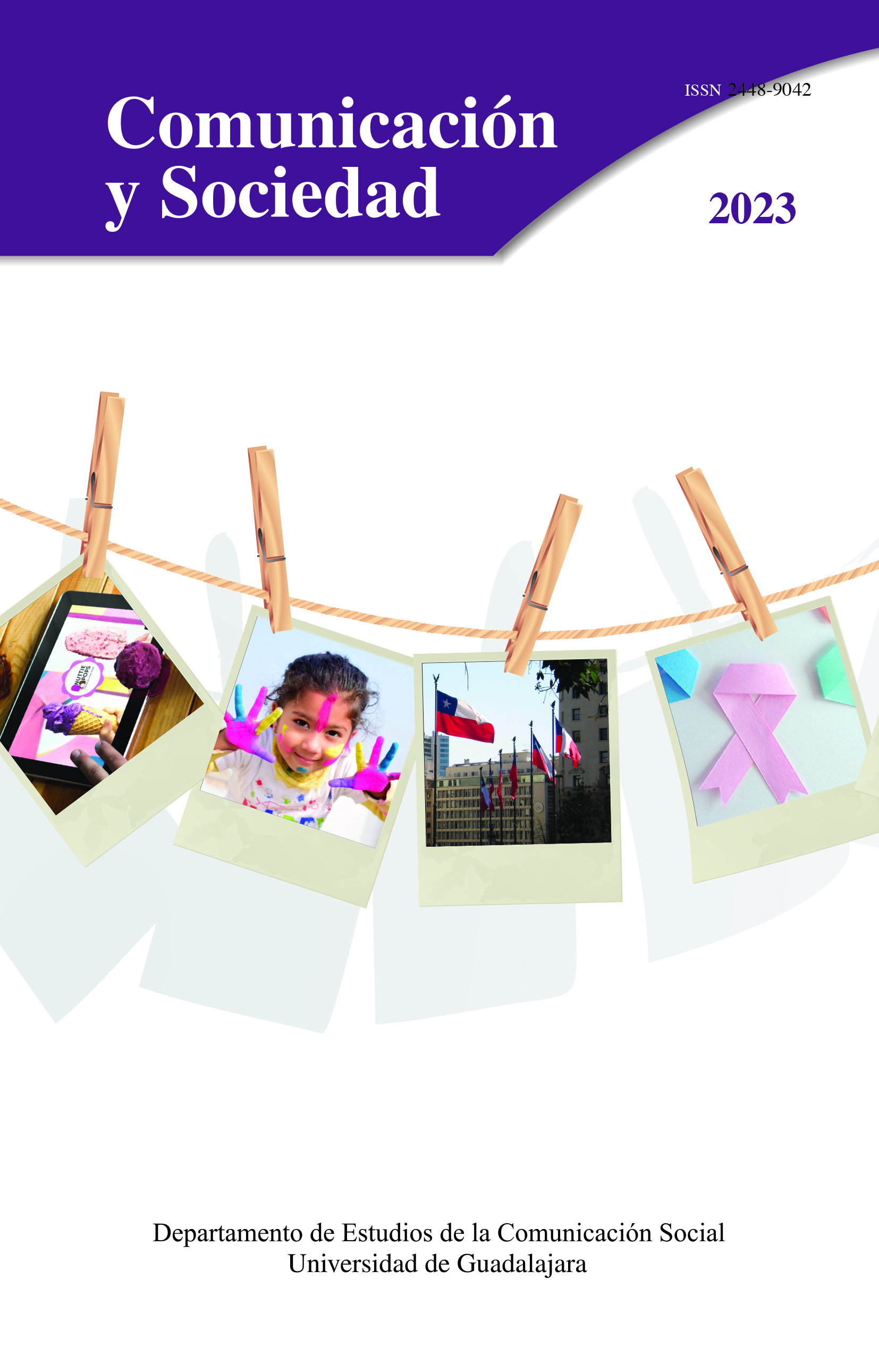La reinvención del videojuego y nuevas formas de consumo en tiempos de confinamiento. Caso Fortnite
DOI:
https://doi.org/10.32870/cys.v2023.8455Palabras clave:
Videojuegos, COVID-19, Consumo, Entretenimiento, Medios digitalesResumen
El propósito de este artículo es analizar cómo la industria del videojuego ha reinventado la manera de consumir contenido de entretenimiento en tiempos de confinamiento; en concreto, estudiamos el caso de Fortnite. El enfoque metodológico es de tipo cualitativo, apoyado en el análisis de contenido y el análisis del discurso de artículos y noticias procedentes de medios digitales españoles. Los resultados revelan tres factores que han propiciado la innovación en la industria: desarrollo de contenido novedoso, celebración de eventos in-game y valor agregado en la experiencia de los jugadores.Descargas
Citas
DJuegos. (2020, 22 de mayo). Tras el tráiler de Tenet, Fortnite permitirá ver gratis una "icónica película" de Christopher Nolan. https://www.3djuegos.com/noticias-ver/204575/tras-el-trailer-de-tenet-fortnite-permitira-ver-gratis-una/
Asadzadeh, A., Samad-Soltani, T. & Rezaei-Hachesu, P. (2021). Applications of virtual and augmented reality in infectious disease epidemics with a focus on the covid-19 outbreak. Informatics in Medicine Unlocked, 24, 100579. https://doi.org/10.1016/j.imu.2021.100579
Barr, M. & Copeland-Stewart, A. (2022). Playing video games during the covid-19 pandemic and effects on players’ well-being. Games and Culture, 17(1), 122-139. https://doi.org/10.1177/15554120211017036
Bernevega, A. & Gekker, A. (2022). The industry of landlords: Exploring the assetization of the triple-A game. Games and Culture, 17(1), 47-69. https://doi.org/10.1177/15554120211014151
Bogost, I. (2007). Persuasive games: The expressive power of videogames. MIT.
Bogost, I., Ferrari, S. & Schweizer, B. (2010). Newsgames: Journalism at play. MIT Press.
Boldi, A., Rapp, A. & Tirassa, M. (2022). Playing during a crisis: The impact of commercial video games on the reconfiguration of people’s life during the covid-19 pandemic. Human–Computer Interaction, 1-42. https://doi.org/10.1080/07370024.2022.2050725
Bowman, N. D., Rieger, D. & Lin, J. T. (2022). Social video gaming and well-being. Current Opinion in Psychology, 45, 101316. https://doi.org/10.1016/j.copsyc.2022.101316
Burdenko, E. V. & Shchepetov, V. V. (2021). Impact of the covid-19 pandemic on the global video games market. International Trade and Trade Policy, 7(1 (25)), 36-51. https://doi.org/10.21686/2410-7395-2021-1-36-5
Bustamante, C. (2020, 24 de abril). Así fue el concierto de Travis Scott en Fortnite. SomosXbox. https://www.somosxbox.com/asi-fue-el-concierto-de-travis-scott-en-fortnite/860957
Carter, M., Moore, K., Mavoa, J., Gaspard, I. & Horst, H. (2020). Children's perspectives and attitudes towards Fortnite 'addiction'. Media International Australia, 176(1), 138-151. https://doi.org/10.1177/1329878X20921568
Carter, M., Moore, K., Mavoa, J., Horst, H. & Gaspard, l. (2020). Situating the appeal of Fortnite within children’s changing play cultures. Games and Culture, 15(4), 453-471. https://doi.org/10.1177/1555412020913771
Cazallas, J. (2020, 22 de mayo). Fortnite retransmitirá una icónica película de Christopher Nolan este verano. Hobby Consolas. https://www.hobbyconsolas.com/noticias/fortnite-retransmitira-iconica-pelicula-christopher-nolan-verano-645609
Cook, C., Schaafsma, J. & Antheunis, M. (2018). Under the bridge: An indepth examination of online trolling in the gaming context. New Media & Society, 20(9), 3323–3340. https://doi.org/10.1177/1461444817748578
Cordero, J. A. (2022). Enseñar a aprender a las máquinas: Mito, tecnología y política. Claves De Razón Práctica, 280, 20-31.
De la Hera, T., Jansz, J., Raessens, J. & Schouten, B. (Eds.). (2021). Persuasive gaming in context. Amsterdam University Press. https://doi.org/10.5117/9789463728805
Díez, J. (2020, 1 de diciembre). Travis Scott desvela el dinero que ganó con su concierto virtual en Fortnite. Areajugones. https://areajugones.sport.es/videojuegos/travis-scott-desvela-el-dinero-que-gano-con-su-concierto-virtual-en-fortnite/
Ellis, L. A., Lee, M. D., Ijaz, K., Smith, J., Braithwaite, J. & Yin, K. (2020). covid-19 as “game changer” for the physical activity and mental wellbeing for augmented reality game players during the pandemic: Mixed methods survey study. J Med Internet Res 2020, 22(12), e25117. https://doi.org/10.2196/25117
Epic Games. (2017). Fortnite: Battle royale
Escribano, J. (2020, 21 de mayo). El tráiler de Tenet, lo nuevo de Christopher Nolan, debutará... en Fortnite. Hobby Consolas. https://www.hobbyconsolas.com/noticias/trailer-tenet-nuevo-christopher-nolan-debutara-fortnite-645463
Ferguson, C. J. (2020). Video games during the time of the plague. Psychological Inquiry, 31(3), 242-246. https://doi.org/10.1080/1047840X.2020.1820222
Fernández Rincón, A. R., Hellín Ortuño, P. A. & Castillo Esparcia, A. (2021). Eventos en la industria de los videojuegos. El caso de Fortnite. Zer, 26(51), 35-53. https://doi.org/10.1387/zer.23062
García, A. (2020, 4 de mayo). Más de 12 millones de personas asisten al concierto del Travis Scott en Fortnite. La Vanguardia. https://www.lavanguardia.com/videojuegos/20200424/48694263501/fortnite-concierto-travis-scott-video.html
García, J. G. (2021, 17 de marzo). Nate Nanzer: “Fortnite’ se ha convertido en una plataforma de entretenimiento social”. El País. https://elpais.com/tecnologia/2021-03-18/nate-nanzer-fortnite-se-ha-convertido-en-una-plataforma-de-entretenimiento-social.html
Gee, J. P. (2010). An introduction to discourse analysis: Theory and method (3era ed.). Routledge. https://doi.org/10.4324/9780203847886
Gómez García, S. (2014). Cambiar jugando. La apuesta de los serious games por la igualdad entre los y las jóvenes. Revista De Estudios De Juventud, 106, 123-132.
Griffiths, M. D., Kuss, D. J. & King, D. L. (2012). Video game addiction: Past, present and future. Current Psychiatry Reviews, 8(4), 308-318. https://doi.org/10.2174/157340012803520414
Hodent, C. (2019). Understanding the success of Fortnite: A UX & psychology perspective. https://celiahodent.com/understanding-the-success-of-fortnite-ux/
Isbister, K. (2016). How games move us. Emotion by design. MIT Press.
Kowert, R. (2020). Dark participation in games. Frontiers in Psychology, 11, 1-8. https://doi.org/10.3389/fpsyg.2020.598947
Krippendorff, K. (2004). Content analysis: An introduction to its methodology (2da ed.). SAGE.
Lacasa, P. (2011). Los videojuegos. Aprender en mundos virtuales y reales. Ediciones Morata, S. L.
Lin, J. T., Bowman, N., Lin, S. & Chen, Y. (2019). Setting the digital stage: Defining game streaming as an entertainment experience. Entertainment Computing, 31, 1-8. https://doi.org/10.1016/j.entcom.2019.100309
López-Cabarcos, M. Á, Ribeiro-Soriano, D. & Piñeiro-Chousa, J. (2020). All that glitters is not gold. The rise of gaming in the covid-19 pandemic. Journal of Innovation & Knowledge, 5(4), 289-296. https://doi.org/10.1016/j.jik.2020.10.004
López-Redondo, I. (2021). El videojuego como área de especialización periodística. Rasgos distintivos y perspectivas profesionales para un sector en auge. Estudios Sobre El Mensaje Periodístico, 27(1), 319-332. https://doi.org/10.5209/esmp.72248
López-Redondo, I. & Angulo Egea, M. (2021). La crisis del covid-19 a través del videojuego. Análisis del discurso de Death Stranding: Una metáfora de la solidaridad en tiempos de pandemia. IC Revista Científica De Información Y Comunicación, 18(2021), 95-113. https://doi.org/10.12795/IC.2021.I18.06
Maheswara, A. M. & Wibowo, V. (2021). Video games as the digital entertainment platform during the covid-19 pandemic. En Sukowiyono, S. Awaliyah, P. B. R. Carey, M. Lane & C. Fei (Eds.), Empowering civil society in the industrial revolution 4.0 (1era ed.) (pp. 44-46). Routledge. https://doi.org/10.1201/9781003180128
Martí-Parreño, J., Bermejo-Berros, J. & Aldas-Manzano, J. (2017). Product placement in video games: The effect of brand familiarity and repetition on consumers' memory. Journal of Interactive Marketing, 38(1), 55-63. https://doi.org/10.1016/j.intmar.2016.12.001
Martí-Parreño, J., Ruiz-Mafé, C. & Scribner, L. L. (2015). Branded entertainment: Past, present, and future. https://doi.org/10.4018/978-1-4666-8342-6.ch001
Maura, C. (2020, 28 de abril). El concierto de Travis Scott en Fortnite atrajo a más de 27,7 millones de participantes. Dot Esports. https://dotesports.com/es/news/el-concierto-de-travis-scott-en-fortnite-atrajo-a-mas-de-277-millones-de-participantes
Moreno Cantano, A. C. & Gómez-García, S. (2021). Videojuegos del presente. La realidad en formato lúdico (1era ed.). Ediciones Trea.
Morla, J. (2020, 19 de julio). Musica, cine y Fortnite: bienvenidos a la convergencia digital. El País. https://elpais.com/cultura/2020/07/13/babelia/1594644943_960470.html
Navarro, J. (2020). Fortnite: A context for child development during covid-19 (and beyond) (USA). Journal of Children and Media, 15(1), 1-4. https://doi.org/10.1080/17482798.2020.1858435
Nielsen. (2021). The future of video gaming is bright—even as real experiences return. https://www.nielsen.com/us/en/insights/article/2021/the-future-of-video-gaming-is-bright-even-as-real-experiences-return
Orme, S. (2021). “Just watching:” A qualitative analysis of nonplayers’ motivations for video game spectatorship. New Media & Society, 24(10), 1 –18. https://doi.org/10.1177/1461444821989350
Paredes-Otero, G. (2021). Videojuegos de simulación social en tiempos de pandemia: El éxito de Animal Crossing: New Horizons. En G. Paredes-Otero & N. Sánchez-Gey Valenzuela (Eds.), De la filosofía digital a la sociedad del video-juego. Literatura, pensamiento y gamificación en la era de las redes sociales (1era ed.) (pp. 1226-1248). Dykinson.
Pearce, K. E., Yip, J. C., Lee, J. H., Martinez, J. J., Windleharth, T. W., Bhattacharya, A. & Li, Q. (2021). Families playing Animal Crossing together: Coping with video games during the covid-19 pandemic. Games and Culture, 17(5), 773–794. https://doi.org/10.1177/15554120211056125
Pinedo, E. (2020, 28 de abril). Otro éxito gracias a la cuarentena: las impresionantes cifras de ‘Fortnite’ y su evento de Travis Scott. Hipertextual. https://hipertextual.com/2020/04/Fortnite-travis-scott-records
Poole, S. (2007). Trigger happy. Videogames and the entertainment revolution. Creative Commons.
Portero Tresserra, M. & Bueno Torrens, D. (2019). Cerebro social y competencias comunicativas durante la adolescencia. Textos De Didáctica De La Lengua Y De La Literatura, 84, 40-46.
Romerales, L. (2020, 12 de mayo). Así viví el festival de música electrónica de Fortnite desde dentro. El País. https://verne.elpais.com/verne/2020/05/09/articulo/1589030665_930801.html
Salen, K. & Zimmerman, E. (2004). Rules of play: Game design fundamentals. MIT Press.
Schöber, T. & Stadtmann, G. (2020). Fortnite: The business model pattern behind the scene. Oder: European University Viadrina Frankfurt. https://doi.org/10.2139/ssrn.3520155
SomosXbox. (2020, 23 de mayo). Fortnite emitirá una película de Christopher Nolan desde el propio juego. https://www.somosxbox.com/Fortnite-emitira-una-pelicula-de-christopher-nolan-desde-el-propio-juego/864448
Soriano, D. (2020, 2 de diciembre). Fortnite: Travis Scott facturó 20 millones de dólares por su concierto. IGN España. https://es.ign.com/fortnite-ps4/169089/news/fortnite-travis-scott-facturo-20-millones-de-dolares-por-su-concierto
Statista. (2020). Registered users of Fortnite worldwide from august 2017 to may 2020 (in millions). https://www.statista.com/statistics/746230/fortnite-players/
Tang, W. Y., Reer, F. & Quandt, T. (2019). Investigating sexual harassment in online games: How personality and context factors are related to toxic sexual behaviors against fellow players. Aggressive Behavior, 46(1), 127–135. https://doi.org/10.1002/ab.21873
Wagner, J., Moger, A., Consalvo, M. & Phelps, A. (2021). 22. (Pandemic) helping grandma home. En D. Davidson, I. Fay, C. Fernández-Vara, J. Pinckard & J. Sharp (Eds.), Well played retrospective. the past, pandemic and future of video games, value and meaning (1era ed., pp. 157-175). Carnegie Mellon University. https://doi.org/10.1184/R1/16699579.v1
Wiederhold, B. K. (2021). Kids will find a way: The benefits of social video games. Cyberpsychology, Behavior, and Social Networking, 24(4), 213-214. https://doi.org/10.1089/cyber.2021.29211.editorial
Descargas
Publicado
Cómo citar
Número
Sección
Licencia

Esta obra está bajo una licencia internacional Creative Commons Atribución-NoComercial 4.0.
Los autores/as que publiquen en esta revista aceptan las siguientes condiciones:
De acuerdo con la legislación de derechos de autor, los autores conservan los derechos de autoría y otorgan a Comunicación y Sociedad el derecho de primera comunicación pública de la obra. Comunicación y Sociedad no realiza cargos a los autores por enviar y procesar artículos para su publicación.
Los autores/as pueden realizar otros acuerdos contractuales independientes y adicionales para la distribución no exclusiva de la versión del artículo publicado en Comunicación y Sociedad (por ejemplo incluirlo en un repositorio institucional o publicarlo en un libro) siempre que indiquen claramente que el trabajo se publicó por primera vez en Comunicación y Sociedad.











